(NOTE: This post was written before Avengers: Endgame ended Marvel’s first-ever multi-film story arc on a very high note. However, I bet you’ll still see a lot of the points listed below in Black Widow, Shang-Chi, and other stand-alone MCU films.)
Thor: Ragnarok is basically a blueprint for how to make a typical Marvel movie.
It’s a fun romp with clever action scenes, decent jokes, and a few iconic images: a glib, lighthearted, enjoyable night at the movies.
Unfortunately, like most Marvel movies these days, it’s also almost completely redundant.
That’s because, apart from some style differences, every Marvel movie since The Avengers assembled has told basically the same story.
To be clear, this isn’t just because all Marvel movies follow three-act structure. Nearly every Hollywood film follows three-act structure, yet most films still manage to feel distinctive from one another while most Marvel films feel eerily the same.
The problem is, Marvel movies have stopped being must-see experiences.
That’s not just because audiences are oversaturated by Marvel these days (although that’s certainly its own issue). The “skippability” of the MCU comes down to a functional problem with the Marvel cinematic universe: every Marvel movie’s purpose is simply to set up the next movie…
and the next…
and the next.
Since 2008’s breakout of Iron Man, Hollywood has been caught in the riptide of Marvel’s unstoppable box office success. This success has caused Marvel to replicate Iron Man’s recipe in pretty much every film. And this by-the-numbers approach has led to a frustrating irony: The successful serialization of Marvel’s cinematic universe paradoxically makes every individual Marvel movie feel… expendable.
As an example, let’s look at what happens in Thor: Ragnarok… and, more tellingly, what doesn’t.
******** WARNING: SPOILERS AHEAD for several Marvel movies ********
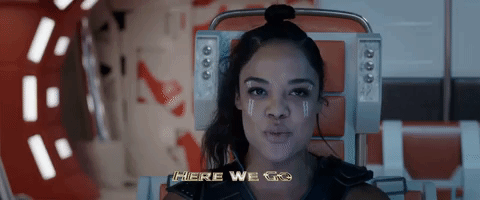
The Marvel Movie Blueprint
If you’re watching a Marvel movie, here are some bets you can safely make:
- The hero’s arc will follow Joseph Campbell’s ‘hero’s journey’ almost word-for-word
- There will be an emotionally-distant antihero
- The hero’s mentor will almost always die
- There will be a sassy, independent, bad-ass woman
- The hero will learn that s/he always had the power to solve Problem X all along
- The final boss battle will be anticlimactic as hell
Seriously, click that Joseph Campbell link above, because Thor: Ragnarok hits every formula beat verbatim. (Although, admittedly, the first two beats happen in Avengers: Age of Ultron when Thor begins his quest to prevent Ragnarok from happening.)
Meeting with the Mentor? Check. (Bye, Odin.)
Crossing the Threshold? Check. (Hello, Jeff Goldblum.)
The Road Back? Check. (Hello, uh… Devil’s Anus.)
The Resurrection? Check. (Sorry, Thor’s eye.)
Return with the Elixir? Check. (Nice helmet, Surtur.)
Kick-ass heroine? Check. (Hello, Valkyrie.)
Emotionally distant antihero? Uhh…
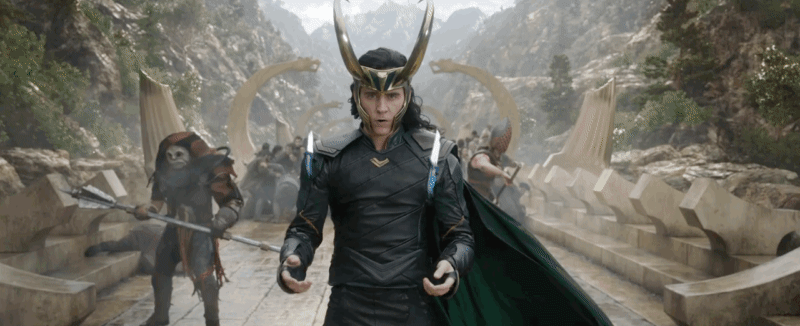
… yeah, check.
Anticlimactic boss battle? Friends, this one is so anticlimactic, it takes place off-camera.
So, yeah, Thor: Ragnarok is a funny, fast-paced, enjoyable two hours that checks all the Marvel movie blueprint boxes. But it also follows nearly the exact same plot, point-for-point, as Doctor Strange… which follows nearly the exact same plot of Iron Man.
In fact, these films are the same right down to the heroes watching their mentors literally die or dissipate into the ether right before the hero’s darkest hour.
Sound familiar?
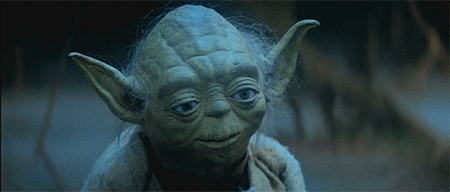
Why Every Marvel Movie Looks the Same
(And no, I don’t just mean visually, although that’s true too.)
Marvel movies follow a formula that’s worked in Hollywood for decades. And they’re not alone. Nearly every Hollywood film follows this formula, which was most obviously documented in Blake Snyder’s screenwriting guide Save the Cat!
The difference is, while most films are self-contained stories, every Marvel movie is part of a larger whole.
As a result, every Marvel movie works less like a film than an episode of a soap opera.
Every threat is redundant.
Every catharsis is temporary.
Any character growth is subject to revision in a future movie.
And every new plot thread now is an excuse to create a new sequel later.
This means when the Hulk flies away from Earth at the end of Avengers: Age of Ultron, we’re trained to expect his subplot to conclude in someone else’s movie, like Thor: Ragnarok two years later.
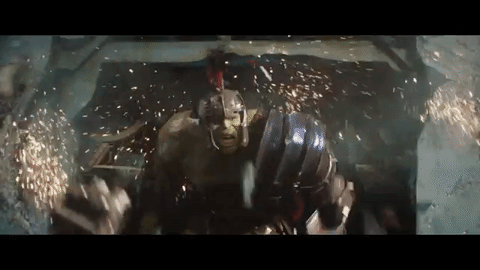
Here we go again…
Now, to be honest, this Marvel movie-as-soap opera machine works really well.
For one thing, seeing these same characters show up every few years is fun. (When Doctor Strange appeared in Thor: Ragnarok, the women in my audience cheered.) Each Marvel movie is like a hangout sitcom, where you get to see your favorite cynics trade sarcastic quips while solving the [ mostly inconsequential ] problem of the week.
This makes every Marvel movie feel like the cinema equivalent of comfort food.
So no, all this serialization by itself isn’t a bad thing.
What is bad about it is that it renders the outcome of every individual Marvel movie meaningless.
To see the negative effects of this technique, consider what’s missing from Thor: Ragnarok: stakes, tension, and closure. (In other words, the building blocks of drama.)
Here are three examples of why those missing ingredients rob the story of its satisfaction.
The Warriors Three
When Thor goes missing in his first movie, who tracks him down? His best friends Hogun, Fandral, Volstagg, and Sif.
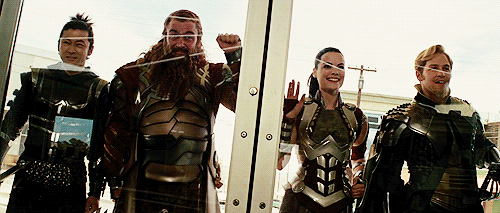
These are characters we’ve spent two movies getting to know. They had vague subplots. In Sif’s case, she had a clear love triangle brewing between Thor and Jane Foster.
So what happens in Thor: Ragnarok?
Volstagg and Fandral are killed by Hela within seconds of appearing onscreen, and Hogun dies two heroic speeches later. (Sif is nowhere to be found, and neither is Jane Foster, because… reasons?)
And how do we mourn these characters that we’ve spent several hours with onscreen since 2011?
We don’t.
We never see them again.
Thor doesn’t ask about them, nor does Loki. The two brothers who grew up fighting alongside these characters don’t shed a single tear for them — and so, by extension, neither do we, because the character’s reactions (or lack thereof) signal to us that these deaths don’t matter.
And neither does the plot, because…
Dead Asgardians Are Just Cannon Fodder
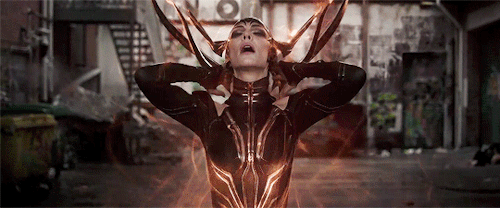
Apparently, Hela’s genius plan in Thor: Ragnarok is to reclaim Asgard is to raise her armies of the dead from their crypts below Odin’s palace… except they’re not very effective soldiers.
Instead, her undead army moves, looks, and sounds like a batch of leftover Uruk-hai from Middle Earth. They mostly serve as background noise for Heimdall to kill as he waits around for Thor to save the day… which he knows is coming, because Heimdall can see everything.
(Side note: Heimdall’s very existence calls into question pretty much every Asgardian plot twist. Why does anyone do anything without consulting with Heimdall first? Heck, why isn’t this movie called Heimdall: Just Killing Time While Thor Wraps Up His Offworld Comedy Subplot?)
But the biggest issue in Thor: Ragnarok isn’t Heimdall’s omniscience or the unfulfilling farewell we get for Odin, the Warriors Three, and every Valkyrie who isn’t named Tessa Thompson.
No, it’s…
Marvel’s Frustrating Reliance on Coincidence to Further the Plot
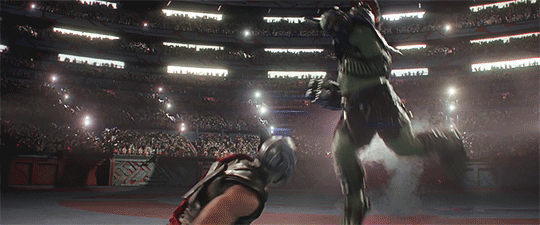
Of all the gladiator arenas in all the universe, he wanders into mine…
There’s a handy rule when it comes to using coincidence in a story: don’t.
But, if you must, use coincidence to get characters into trouble, not get them out of it.
Unfortunately, Thor: Ragnarok uses coincidence for… uh… everything.
Consider:
- Thor and Loki find Odin literally as he’s about to die
- Odin dies literally as Hela returns to the nine realms
- Hela fights Thor and Loki and knocks them both into the outer galaxy… where they both land on the exact same planet, even though they were on separate trajectories
- Who finds Thor on this planet? Valkyrie, who is yet another Asgardian.
- What’s Valkyrie’s internal conflict? She’s ashamed and traumatized after fleeing from battle with Hela long ago… and hey, guess who the villain of this story just happens to be!
- As it turns out, what’s the one thing that can stop Hela? Why it just so happens to be the MacGuffin that Thor acquired in the opening scene!
As we’ve previously seen in both Thor and Guardians of the Galaxy, the Marvel universe is teeming with thousands of planets. What are the odds that Thor, Loki, Valkyrie, and the Hulk would all end up on the same random planet as Asgard is burning? Probably only slightly worse than two of the Warriors Three manning the Bifrost when Hela arrives, allowing her to murder them instantly without requiring a logical setup.
These are the kinds of coincidences that happen when characters are slaves to the plot, rather than when plots naturally develop from their characters’ choices.
And why is that the case in most Marvel movies and TV shows now?
Because once the Avengers were assembled, Marvel ran out of goals.
Now each Marvel movie doesn’t further the universal story; it just exists to justify its own sequel.
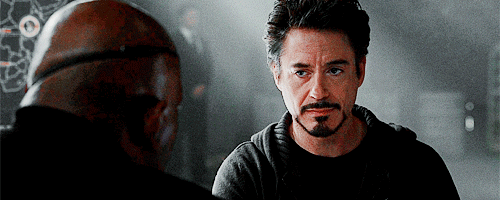
The Marvel Movie Serialization Problem
To be fair, when you read an issue of a Thor comic, you don’t really expect Thor to die.
After all, the book is called Thor. You expect him to be there again next month.
But when we spend $12 to watch a Marvel movie in theaters, our filmgoing brains have different expectations about how tension and closure work.
A century of stand-alone films has trained us to expect each movie we see to work as its own story. Not until The Fellowship of the Ring in 2001 did we have to confront the possibility of films-as-episodes, or the concept of delaying cinematic closure for years on end — or, in Marvel’s case, potentially forever.
So, now, we go in to each Marvel film expecting… what, exactly?
Some character-based puns? Sure.
A few riveting action scenes? Obviously.
One or two changes that will have ripple effects on other films? If we’re lucky.
But do you really expect to feel anything?
To be fair, maybe that’s an unreasonable expectation of a popcorn blockbuster.
As I said, Marvel movies and TV series are basically digital comfort food. They tell easy, familiar stories with just enough variation to feel like the $12 and two hours (or, in the case of Netflix, 13 hours) you spent staring at a screen was worth it.
But Marvel movies are no longer pop culture events. Now they feel like pop culture obligations. We see them because they’re the closest thing we have to a nationally unifying story.
And as long as they keep making this much money, they won’t stop following their high-revenue, low-payoff box office blueprint anytime soon.
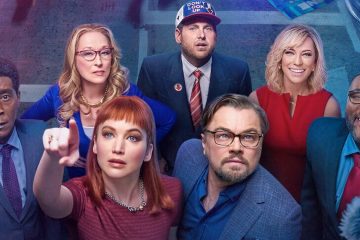
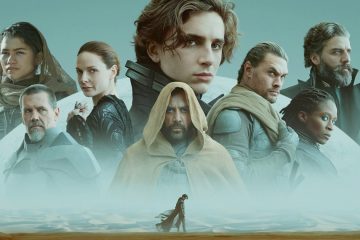
10 Comments
Richard Edwards · February 24, 2019 at 12:08 pm
Anticlimactic final boss battle? Thor doesn’t win. He can’t defeat the final boss (his sister) and his home is destroyed and his people become refugees. How is that ending even remotely like any other marvel film ending? Also, the movie does not follow the Joseph Campbell hero formula, but even if it did, he’s a hero. Thor is a mythic hero, so even if it did follow this formula it would be completely appropriate. It’s obvious you do not like superhero movies and that you haven’t even seen all the marvel films.
Alec · October 22, 2018 at 9:28 am
I think that you are quite uninformed on the whereabouts of Jane Foster and Lady Sif. First, Jane Foster was mentioned. The movie made if clear that her and Thor had broken up. They probably did so because they couldn’t see each other often. Also, the directors of Infinity War have made it clear that Lady Sif was off on other matters in Thor 3 and that she was killed in the snap. I would get some substantial facts before writing my next review. Please don’t act like Marvel is bad. The movies are all leading up to the next which has never been done before with different characters.
Quintin · May 14, 2018 at 12:49 pm
Great article, with some very good points. I think there is one element you seemed to have glossed over though, which funnily enough is the one taken directly from comic books, that of compressed storytelling. Comics can’t use the brevity of books and make everything logically line up, so comic books have to rely on a lot of “coincidence”, which is why in comics this is usually played either for dramatic or comedy purposes, as they simply can’t escape doing a little hand waving to make the plot work. This unfortunately also effects any emotional resonance the story wants to deliver, as anything is a distraction from the main story. This is not unusual for blockbuster films either (probably why the two languages -that of comics and blockbuster films- line up so well), where any emotional resonance is crow-barred in more to fulfill a quota instead of actual character development. I don’t think that overall this is a problem though, as long as you go in knowing the rules if such a film and are happy with that.
george pepper · February 19, 2018 at 2:20 pm
hela arriving just as odin dies isnt coincidence if you consider maybe odin was keeping her out with his remaining life? other then that its all correct, but that wont stop me from enjoying the movie because its funny and well written/acted, and very colorfull. the same story can be told multiple times, and as long as its told well, and differently, it can be somewhat good. marvel does a good job with their formula. they make each movie the same plot but each movie a different story and they tell those stories good, though ive heard black panther lacked in some good story telling elements such as making the characters struggle between king and fighter actually mean something to the viewer.
Justin · February 19, 2018 at 2:27 pm
I enjoyed Thor: Ragnarok, but that’s because Marvel’s formula almost guarantees a decent film. And as long as it does, I doubt they’ll stray from it. (Really, why would they?)
I think Black Panther is among their better movies, and I think its story is stronger than average because the conflict is directly tied to the hero’s identity / self-image. Maybe Thor’s role in Infinity War will involve some aspect of that too — his role as a king vs. his instincts as a warrior.
Ryan · July 31, 2023 at 2:52 am
You are right, Odin’s death triggers the arrival of Hela, so that isn’t a coincidence. That is explicitly explained. That they all end up on the same planet is likely because of all the worm holes that open there.
Mark · January 11, 2018 at 12:28 pm
I would like to politely disagree with you and state that I believe that Thor: Ragnarok is a highly significant and deeply spiritual film and here are my reasons why if you would care to indulge me: http://thinkspiritual.ca/episode-6-thor-ragnarok
Karim Groves · December 5, 2017 at 10:12 pm
I feel like it goes beyond just Marvel unfortunately; for some reason I haven’t been able to put my finger on – American audiences have been systematically ‘dumbed’ down which explains the dearth of recycling happening. Both in Marvel movies, endless sequels, remakes and reboots; can you even remember a time when we used to reward originality? Appreciate a movie or a show that correlated to real life or that approached a very uncomfortable issue in society today that was conspicuously overlooked until some writer/director had the nerve to put it front and center? That’s why Captain America: TWS was so well received critically but it’s remarkably hard to chart new territory. By the time it occurs to Hollywood to try this out, movie theaters will be extinct and the very niches that TV networks have avoided will be all that’s left to really win a place on any screen in our homes because the sheer amount of control viewers will have all but guarantees that ‘mainstream’ will become an afterthought.
10 Surprising Facts About ‘Black Panther’ - ReportWire · October 26, 2023 at 5:49 am
[…] talent into a system that churns out movies that have a dash of originality yet nonetheless often feel the same. Director Ryan Coogler wasn’t interested in having his vision diluted, and he only agreed to […]
Story Structure: The Ultimate Guide (With Graphs!) — VanillaGrass · September 2, 2020 at 11:37 am
[…] Any Marvel movie (note, the heroes in these stories usually earn their endings which contributes to their universal appeal) […]